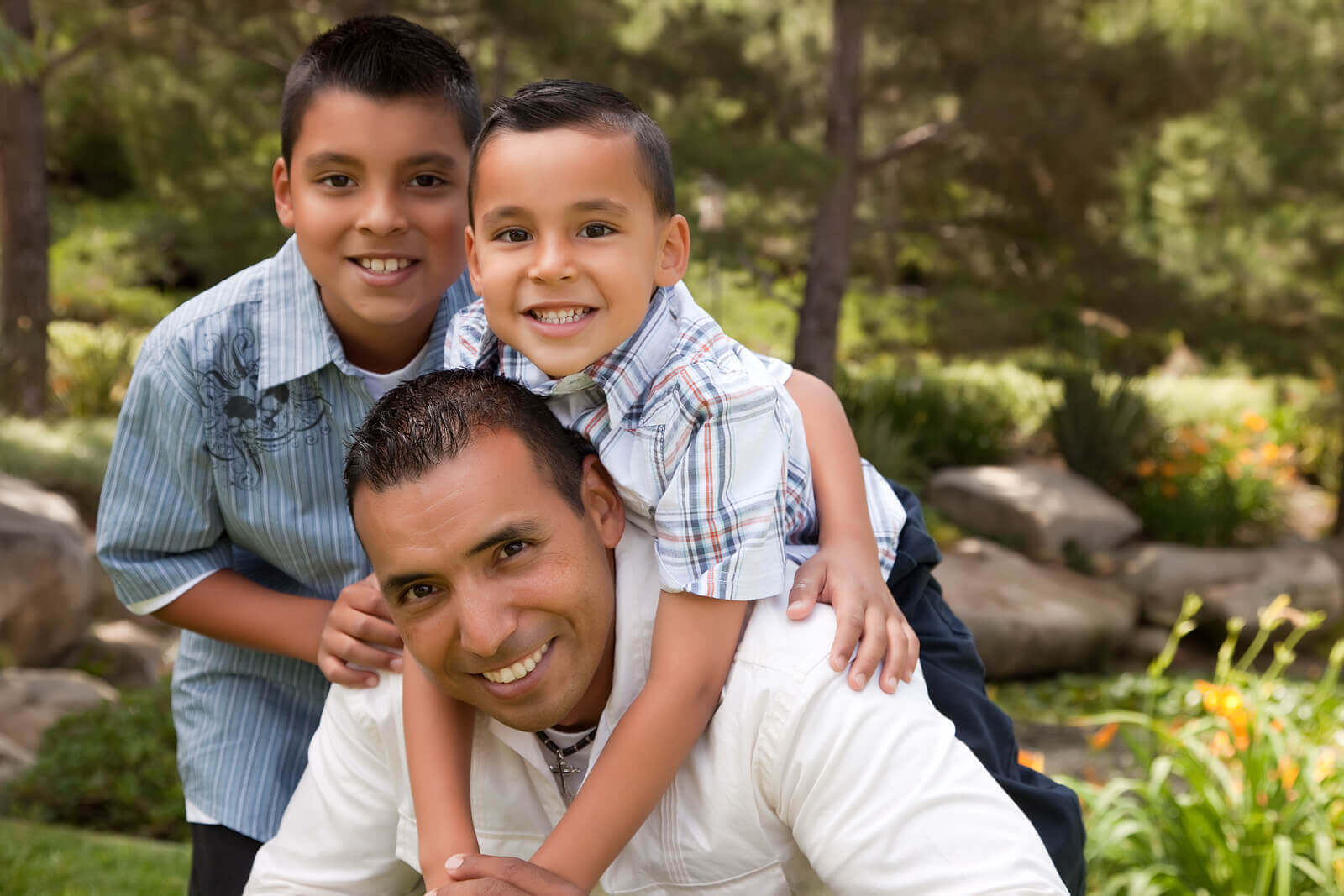The Importance of Physical Contact in Raising Children

A hug, a snuggle, holding hands – all of these actions calm sadness and reduce the effects of stress. Therefore, parents should be aware of the importance of physical contact when it comes to raising our children. Especially when it comes to small children, body-to-body interactions have a great influence on health and development. To be more specific, we’re referring to physical, emotional, mental, and cognitive development in children.
Physical contact, health, and emotional wellbeing
Physical contact between people sets off a series of physiological mechanisms that contribute to improved mood and overall health. A hug during times of stress can help reduce the cortisol production that stress provokes.
We all know that massaging babies’ temples or holding them close can help them fall asleep. But do you know why? This contact increases serotonin levels, a substance related to mood and sleep regulation.

So, as you’ll see, physical contact is important in the raising of our children because of its countless and varied benefits. When children grow up in an environment where parents demonstrate physical affection, some of the benefits include:
- Improves social and communicative relationships.
- Reduces stress and anxiety, and improves the handling of both.
- Reduces pain perception.
- Improves mood in general.
- Physical contact boosts self-esteem and motivation.
- Improves the learning process.
Physical interaction: Nourishment for our children
Just like the milk that a baby drinks each day, we can say that physical contact with loved ones is also an essential nutrient to healthy growth. Children need snuggles, kisses, hugs, physical closeness, and protection just as much as they need to eat. Therefore, raising children must involve healthy and constant physical interaction.
Physical closeness with our children, from an early age, allows them to develop on a deeper level. Therefore, contrary to popular belief, it can help reinforce your relationship with your children… Even when they reach adolescence and adulthood.
In this sense, the importance of physical contact lies in that it’s a form of communication between parents and children. In other words, physical contact between one person and another, body to body, is a means of non-verbal communication.
By means of physical interaction, human beings also express themselves. Therefore, physical interaction with our children is a non-verbal way to dialogue, negotiate, and educate them.
“Touch seems to be as essential as sunlight.”
– Diane Ackerman –

Physical contact as something natural
It’s important that adults and parents are aware that physical interaction with our children should occur naturally. In other words, we should demonstrate affection towards our little ones through physical contact. And, at the same time, we should try to encourage them to do the same.
However, we can’t force all children to express themselves through physical contact all the time and in every situation. Every child and adolescent has their own personality. What’s more, they’ll all show and receive affection in their own way and in their own time. Not all children (or adults) feel comfortable with a lot of physical displays of affection.
Therefore, it’s up to children – according to their particularities and needs – to set limits and times when it comes to physical affection. So, in that sense, making physical contact natural means teaching kids that physical affection is unselfish, and we should give it without expecting or demanding anything in return.
This way, children will understand and internalize a very important concept. That is, physical contact must always be the product of trust and mutual consent. This is fundamental in the development of self-determination regarding one’s own body. What’s more, it helps children learn to distinguish between positive physical contact and that which involves ulterior motives and negative connotations.
A hug, a snuggle, holding hands – all of these actions calm sadness and reduce the effects of stress. Therefore, parents should be aware of the importance of physical contact when it comes to raising our children. Especially when it comes to small children, body-to-body interactions have a great influence on health and development. To be more specific, we’re referring to physical, emotional, mental, and cognitive development in children.
Physical contact, health, and emotional wellbeing
Physical contact between people sets off a series of physiological mechanisms that contribute to improved mood and overall health. A hug during times of stress can help reduce the cortisol production that stress provokes.
We all know that massaging babies’ temples or holding them close can help them fall asleep. But do you know why? This contact increases serotonin levels, a substance related to mood and sleep regulation.

So, as you’ll see, physical contact is important in the raising of our children because of its countless and varied benefits. When children grow up in an environment where parents demonstrate physical affection, some of the benefits include:
- Improves social and communicative relationships.
- Reduces stress and anxiety, and improves the handling of both.
- Reduces pain perception.
- Improves mood in general.
- Physical contact boosts self-esteem and motivation.
- Improves the learning process.
Physical interaction: Nourishment for our children
Just like the milk that a baby drinks each day, we can say that physical contact with loved ones is also an essential nutrient to healthy growth. Children need snuggles, kisses, hugs, physical closeness, and protection just as much as they need to eat. Therefore, raising children must involve healthy and constant physical interaction.
Physical closeness with our children, from an early age, allows them to develop on a deeper level. Therefore, contrary to popular belief, it can help reinforce your relationship with your children… Even when they reach adolescence and adulthood.
In this sense, the importance of physical contact lies in that it’s a form of communication between parents and children. In other words, physical contact between one person and another, body to body, is a means of non-verbal communication.
By means of physical interaction, human beings also express themselves. Therefore, physical interaction with our children is a non-verbal way to dialogue, negotiate, and educate them.
“Touch seems to be as essential as sunlight.”
– Diane Ackerman –

Physical contact as something natural
It’s important that adults and parents are aware that physical interaction with our children should occur naturally. In other words, we should demonstrate affection towards our little ones through physical contact. And, at the same time, we should try to encourage them to do the same.
However, we can’t force all children to express themselves through physical contact all the time and in every situation. Every child and adolescent has their own personality. What’s more, they’ll all show and receive affection in their own way and in their own time. Not all children (or adults) feel comfortable with a lot of physical displays of affection.
Therefore, it’s up to children – according to their particularities and needs – to set limits and times when it comes to physical affection. So, in that sense, making physical contact natural means teaching kids that physical affection is unselfish, and we should give it without expecting or demanding anything in return.
This way, children will understand and internalize a very important concept. That is, physical contact must always be the product of trust and mutual consent. This is fundamental in the development of self-determination regarding one’s own body. What’s more, it helps children learn to distinguish between positive physical contact and that which involves ulterior motives and negative connotations.
All cited sources were thoroughly reviewed by our team to ensure their quality, reliability, currency, and validity. The bibliography of this article was considered reliable and of academic or scientific accuracy.
- Twardosz, S. (2005). Demostrar calidez y afecto a los niños. Recuperado de https://challengingbehavior.cbcs.usf.edu/docs/whatworks/WhatWorksBrief_20_sp.pdf
- Stamatis, P. J. (2011). Comunicación no verbal en las interacciones de aula: una perspectiva pedagógica sobre el contacto físico. Electronic Journal of Research in Educational Psychology, 9(3), 1427-1442. Recuperado de https://www.redalyc.org/pdf/2931/293122852021.pdf
- Arias Borja, M. L. (2012). La autodeterminación en los niños de 6 a 12 años de edad, diseño de un programa de capacitación para padres y maestros para desarrollar la autodeterminación en los niños de educación general básica (Bachelor’s thesis, QUITO/PUCE/2012). Recuperado de http://repositorio.puce.edu.ec/bitstream/handle/22000/5482/T-PUCE-5711.pdf?sequence=1&isAllowed=y
- Freixas, C. P. (2017). Comunicación no verbal. Editorial Kairós. Recuperado de https://books.google.es/books?hl=es&lr=&id=FO6bDwAAQBAJ&oi=fnd&pg=PT5&dq=que+es+la+comunicacion+no+verbal&ots=c_DcthYssM&sig=neu1RO66vevGTdGs9WkuDdLr4Wg#v=onepage&q&f=false
This text is provided for informational purposes only and does not replace consultation with a professional. If in doubt, consult your specialist.








